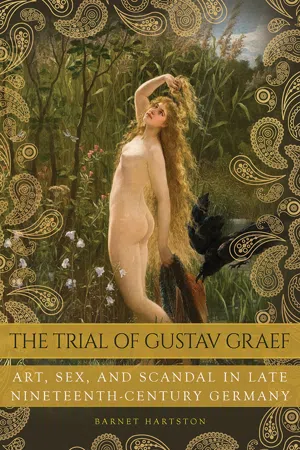
The Trial of Gustav Graef
Art, Sex, and Scandal in Late Nineteenth-Century Germany
- 290 pages
- English
- ePUB (mobile friendly)
- Available on iOS & Android
About This Book
Although largely forgotten now, the 1885 trial of German artist Gustav Graef was a seminal event for those who observed it. Graef, a celebrated sixty-four-year-old portraitist, was accused of perjury and sexual impropriety with underage models. On trial alongside him was one of his former models, the twenty-one-year-old Bertha Rother, who quickly became a central figure in the affair. As the case was being heard, images of Rother, including photographic reproductions of Graef's nude paintings of her, began to flood the art shops and bookstores of Berlin and spread across Europe. Spurred by this trade in images and by sensational coverage in the press, this former prostitute was transformed into an international sex symbol and a target of both public lust and scorn. Passionate discussions of the case echoed in the press for months, and the episode lasted in public memory for far longer. The Graef trial, however, was much more than a salacious story that served as public entertainment. The case inspired fierce political debates long after a verdict was delivered, including disputes about obscenity laws, the moral degeneracy of modern art and artists, the alleged pernicious effects of Jewish influence, legal restrictions on prostitution, the causes of urban criminality, the impact of sensationalized press coverage, and the requirements of bourgeois masculine honor. Above all, the case unleashed withering public criticism of a criminal justice system that many Germans agreed had become entirely dysfunctional. The story of the Graef trial offers a unique perspective on a German Empire that was at the height of its power, yet riven with deep political, social, and cultural divisions. This compelling study will appeal to historians and students of modern German and European history, as well as those interested in obscenity law and class and gender relations in nineteenth-century Europe.
Frequently asked questions
Information
Table of contents
- Cover Page
- Title Page
- Copyright Page
- Dedication
- Table of Contents
- List of Illustrations
- List of Abbreviations
- Acknowledgments
- Prologue
- Introduction
- Chapter One | The Rise and Fall of Gustav Graef
- Chapter Two | The Trial As Public Spectacle
- Chapter Three | Artists and Philistines
- Chapter Four | Women’s Voices / Women’s Silences
- Chapter Five | Stories About Others
- Chapter Six | A Criminal Justice System in Crisis
- Chapter Seven | Power Conflicts in the Courtroom
- Epilogue
- Conclusion
- Notes
- Bibliography
- Index